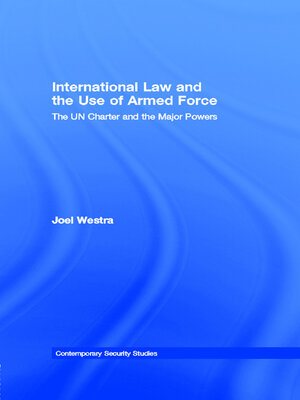International Law and the Use of Armed Force
ebook ∣ The UN Charter and the Major Powers · Contemporary Security Studies
By Joel Westra

Sign up to save your library
With an OverDrive account, you can save your favorite libraries for at-a-glance information about availability. Find out more about OverDrive accounts.
Find this title in Libby, the library reading app by OverDrive.



Search for a digital library with this title
Title found at these libraries:
| Library Name | Distance |
|---|---|
| Loading... |
Since the UN Charter came into effect in 1945, there have been numerous incidents in which one or more of the five major powers (at least arguably) violated the Charter's Article 2(4) prohibition of force. Such incidents notwithstanding, this book demonstrates how the Charter restrains the major powers' military actions. As an instrument of international order, the Charter provides a framework of legal rules restricting the use of armed force. Although these rules are subject to auto-interpretation by the major powers (as a consequence of their veto), they create an expectation of compliance that subjects the major powers' military actions to international scrutiny. To reduce the likelihood of resistance from states threatened by such actions, major powers exercise prudential restraint, altering the manner and timing of their military actions in accordance with the legal arguments offered to justify those actions as consistent with the Charter and therefore not threatening to the existing international order.
The book evaluates the efficacy of the Charter using large-N methods and five case studies: US intervention in the Caribbean, 1953–61; Anglo- French intervention in Egypt, 1956; Soviet intervention in Hungary, 1956; US–British intervention in Iraq, 1990–98; and US–British intervention in Iraq, 1999–2003. The book's extensive focus on the two Iraq cases provides a basis for timely evaluation of the continuing salience and possible reforms of the UN Charter system.
This book will be of much interest to students of security studies, the UN, international law, and international relations.







